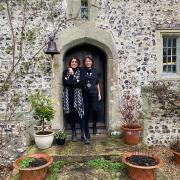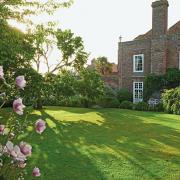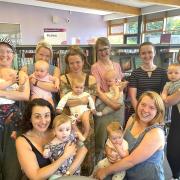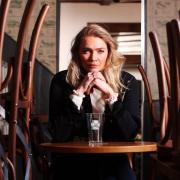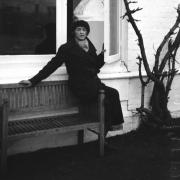It seems that every month we hear dire warnings on the future of bees and the potential damage to us, further up the food chain. So it's good news indeed that record numbers are taking up beekeeping in Sussex, as Linda Harrison discovers
The plight of the humble honey bee has created quite a buzz recently.Bees have been around for 110 million years and play a vital part in our environment, diet and general health.Over the past couple of years, we’ve been warned that our bee population is in decline. Their disappearing habitat, the use of pesticides, and Colony Collapse Disorder (CCD), have all contributed to a decline in numbers. That is, until recently. We’ve started coming to their rescue, and record numbers are now taking up beekeeping as a hobby in Sussex.In the past year, membership has risen by about a third to almost 600 at the Sussex Beekeepers Association, which covers mainly East Sussex. And it’s a similar story elsewhere in the county, with West Sussex Beekeepers Association and Central Sussex Beekeepers Association also recording bumper years.The thing is that you don’t need acres of land to have your own hive. Although, with the average colony made up of 50,000-60,000 bees, it would be wise to make sure you’re not averse to the odd sting.The Sussex Beekeepers Association has five divisions, each offering practical help and advice to newbies. Heather McNiven is chair of the Brighton and Lewes division and has been busy acting as a mentor to those interested in the craft. The branch has seen 45 new members join in the past 12 months – compared to the usual 10 – and the new intake has swelled the ranks to about 170.Heather says: “Bees have really captured people’s imaginations, and things have just escalated in the past couple of years. We get all sorts of people of all ages joining.”Heather has kept bees for about five years and has 14 hives – including eight in her sprawling garden in Burgess Hill, West Sussex.She says most gardens can accommodate a couple of hives, as long as they face a tall wall or hedge to ensure their residents fly up on exit. And as well as doing something good for the environment, there is of course the advantage of gaining a healthy honey supply. Heather’s bees produced a bumper crop of 300 lb of honey in 2010. Demand by new members has been so high, volunteers at the association have been working flat out, holding regular meetings and talks. Last year, they even had to put on extra meetings. And their enthusiasm is hugely infectious. “I started keeping bees when I retired,” says Heather. “I wanted to help my grandson Ben with his eczema and hay fever and I’d read about the benefits of eating local honey.“It’s very rewarding, especially seeing a colony make it through the winter. It’s just lovely. You get a feeling for some colonies and you start looking forward to seeing how they’ll come on. You develop a rapport with them.”Heather obviously has a lot of affection for her bees, or, as she refers to them, “the girls”. In winter it’s only the queen and workers (the girls) in the hive. The male drones are driven out in autumn and usually die (their main function - to mate - being over). In the spring the queen starts laying again and can produce up to 2,000 eggs a day. Heather’s other hives are in two out- apiaries - areas of designated ground where bees can be kept - the locations of which are kept secret. And, inevitably for a beekeeper, she has been stung, but points out bees only sting if they feel threatened.“Education is so important,” says Heather. “There are so many new members now, if they don’t get taught and mentored it’ll be chaos. There’ll be swarms everywhere! If you know what to look for, you can catch a colony before it swarms, and then if you have another hive you can take the old queen and transfer a few trays of bees with her. That way you get another colony.”Heather, a qualified nurse who ran residential homes before retirement, is usually the main port of call for the council and police when swarms are spotted. She takes them, and the all-important queen, to members waiting to start a colony. Last year, the division obtained swarms for all 30-40 people on its list.
For more information on beekeeping, as well as talks and events in your area, see:Sussex Beekeepers Association: www.sussexbee.org.uk Central Sussex Beekeepers’ Association: www.centralsussexbka.org.ukWest Sussex Beekeepers’ Association: www.britishbee.org.uk/local/westsussex
Bee Facts:Beekeeping is believed to have originated about 6,000 years ago in China and Egypt.A worker bee lives for about six weeks in the summer. Drones usually last about 60 days. Queens can live for two to five years.A bee has five eyes.Bees can travel two to three miles in search of pollen and nectar. They visit 50-100 flowers during one trip and must tap two million flowers to make 1lb of honey.Bee-friendly flowers and plants include crocuses, ivy and lavender.
It costs about �400 to set up as a beekeeper, including hive, veil and gloves.Pollination contributes �200 million annually to the agricultural economy.
First swarmers
Two new members who received their first swarm in 2010 were Anne and George Eves.Anne, an interpreter, says: “We wanted pollination for the flowers in our garden and some honey too. We have a large garden and chickens, grow our own vegetables and fruit, it’s kind of like The Good Life.“So we started looking into what was involved in keeping bees. We got a hive in January 2010 and did a lot of reading and went on some courses, including one at Plumpton College.“You need a lot of help. You need to ask questions but the local groups are wonderful, with speakers on topics such as natural beekeeping and avoiding chemicals. “We soon realized that no one beekeeper agrees with another! You have to decide what works best for you.”New beekeepers must also learn about bee health, including one of the biggest threats, the varroa mite.George and Anne’s first hive was new, but they picked up their second at Lewes Flea Market. “We painted it pink,” says Anne, from Burgess Hill. “It was white originally, and very old and battered. But bees really like purples and blues.” Anne, 50, says “We’re still feeling our way, such as learning how to check the queen is laying – if you can see the eggs, you know everything’s OK. But you do need a magnifying glass! “Bees are so interesting and intelligent. One of the great things about beekeeping is that you meet people from all walks of life. One man we’ve met is in his 90s and knows everything there is to know about keeping bees. He’s been stung on every part of his body – except his eyeball.”January is an ideal month to start thinking about taking up beekeeping. But a word of warning from Pam Hunter, chair of Central Sussex Beekeepers: “It isn’t a hobby you can just bumble through,” she says. “You can soon get smitten. Be sure you have enough time to make the commitment to beekeeping.”If you’re tempted, it’s essential to try some local meetings and get as much experience as you can. Get a mentor, or bee-buddy, and buy a hive (the new ones come flatpacked) and the protective clothing by the end of March. Then add your name to your local swarm list and wait for a delivery.Above all, it’s important to be comfortable around bees and to learn how to handle them.Heather advises: “Handle them very slowly, gently and with care. Remember that they are livestock, they need to be treated with respect.”













